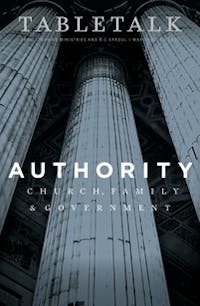
Request your free, three-month trial to Tabletalk magazine. You’ll receive the print issue monthly and gain immediate digital access to decades of archives. This trial is risk-free. No credit card required.
Try Tabletalk NowAlready receive Tabletalk magazine every month?
Verify your email address to gain unlimited access.
Matt, I don’t understand how you and Steve can be a part of the same church given what you each believe and practice.” This came from a young woman with whom my wife and I had been sharing the gospel.
“I don’t understand,” I replied.
She said, “Steve lives with his girlfriend, which seems inconsistent with what you tell me a Christian should believe and do.”
I was speechless. I didn’t know the young woman knew Steve, nor did I know Steve lived with his girlfriend. Since I did not know Steve that well myself, I went to our pastor, who did. What was the pastor’s response to my suggestion that we should investigate and, if Steve was unrepentant, to discipline? “If we kick him out, how will he hear the gospel?” (Side note: The pastor, too, was later found to be in sexual sin.)
Church member Steve’s unrepentant sin — since it remained unchallenged — hurt our church’s evangelism. Not only that, it harmed weaker sheep in the church. And it brought shame on the name of Christ.
God gave a remedy for such situations in passages like Matthew 18 and 1 Corinthians 5 — what the church has always called “church discipline” or “excommunication.”
What is church discipline? In the narrowest sense, it is the act of excluding someone who professes to be a Christian from membership in the church and participation in the Lord’s Supper for serious unrepentant sin — sin they refuse to let go of.
More broadly, church discipline is the act of excluding an individual who carelessly brings disrepute onto the gospel and shows no commitment to doing otherwise. Discipline helps the church to reflect God’s glorious character faithfully. It helps the church to remain holy.
Why should we even care, let alone practice church discipline? Let me give you five reasons:
God’s glory. God’s people should reflect God. Under both the old and new covenants (Mal. 3:18; 1 Cor. 5:11), the people of God are called to be a distinct community. They are to image the one, true, living God, not bow down to lifeless idols. This distinctiveness brings glory to God, because God is distinct, that is, holy.
The unrepentant sinner. In 1 Corinthians 5:5, the apostle Paul calls the church to “deliver this man to Satan…so that his spirit may be saved in the day of the Lord.” Put the sinner out, so that he might come back in — back into the fold, back into the redeeming hands of the Savior. Church discipline is fundamentally a loving act that holds out the hope of Christ for the unrepentant sinner.
The young believer. In every church there are young believers who are trying to untangle their minds from the world and re-orient themselves around God’s truth. These young lambs are particularly vulnerable when unrepentant sin goes unaddressed. Church discipline helps these young ones better understand what it means to be in but not of the world.
The steadfast Christian. Christians are warned in 1 Corinthians 10:12: “Anyone who thinks that he stands take heed lest he fall.” Church discipline, rightly practiced, should sober every believer, including the mature. When discipline is carefully, lovingly practiced in my own church, the elders often find themselves inundated with a rush of invitations for lunch — sheep asking for accountability. The act of discipline acts as a wake-up call. The mature heed such a warning.
The neighbors. Every church has watching neighbors. When church members live like the world, they send a clear message to those neighbors: nothing different here! The Christian church is to be the aroma of Christ (2 Cor. 2:15), an attraction to unbelieving neighbors. Discipline keeps the church “smelling” good!
Many years ago, after my church had suffered through another brief, failed pastorate, I left our church building after one meeting and headed toward the corner grocery store. On the way, I found myself walking behind two locally well-known homosexual men and was just close enough to hear them mocking my church over its recent troubles.
Do you see how sin brings disrepute on the name of Christ and His people? The world looked on us and mocked. Sin in the church, left unaddressed, hurts our evangelism, leaves the proud unchecked, confuses young believers, hardens the unrepentant, and, worst of all, brings shame on the name of Christ.
God, in His providence, brought a new spirit into our church nearly two decades ago with a clear gospel, biblical faithfulness, godly leadership, right understanding of membership, and the practice of church discipline. We were finally living in the church and before the world the way we believe God called us to live. How do I know?
A few years back, a long-time neighbor of our church stopped a friend and me outside of our church building. The neighbor said, “There’s something different about your church.”
My friend said something sheepish like: “Well, we’ve been trying to clean up the grounds and building.”
The neighbor replied, “No, I’m not talking about the property. I’m talking about the people. There’s something different here now.”
Yes! Yes! A thousand times yes!
